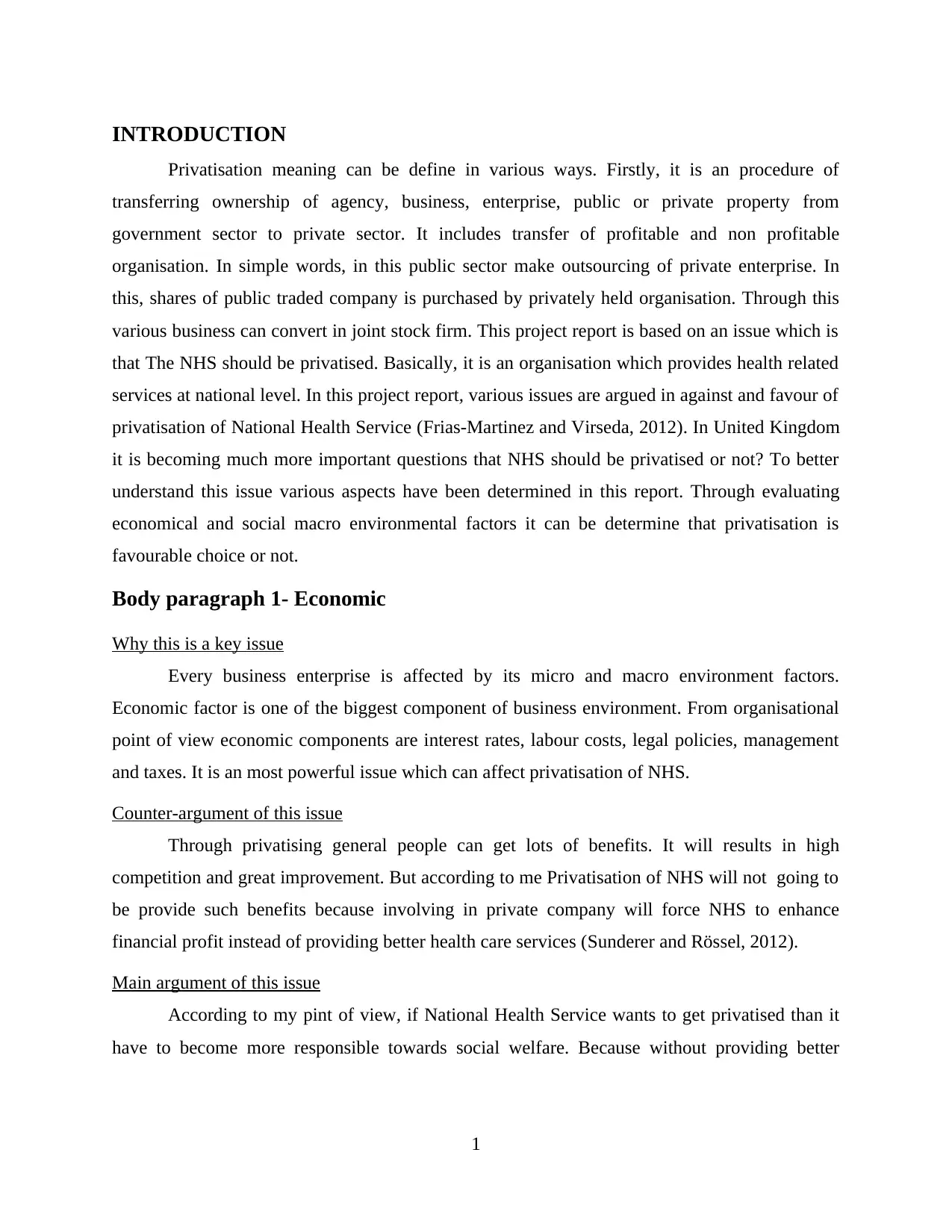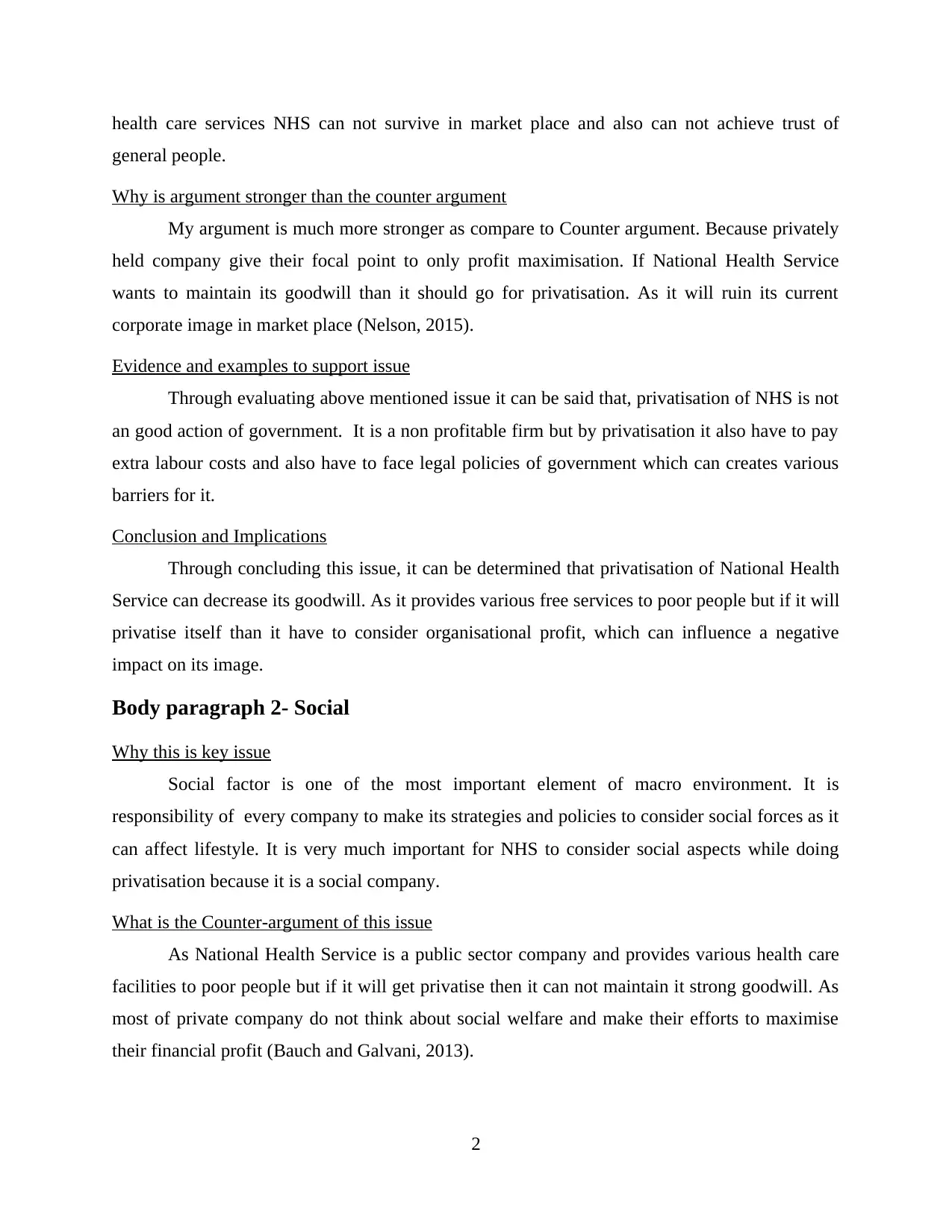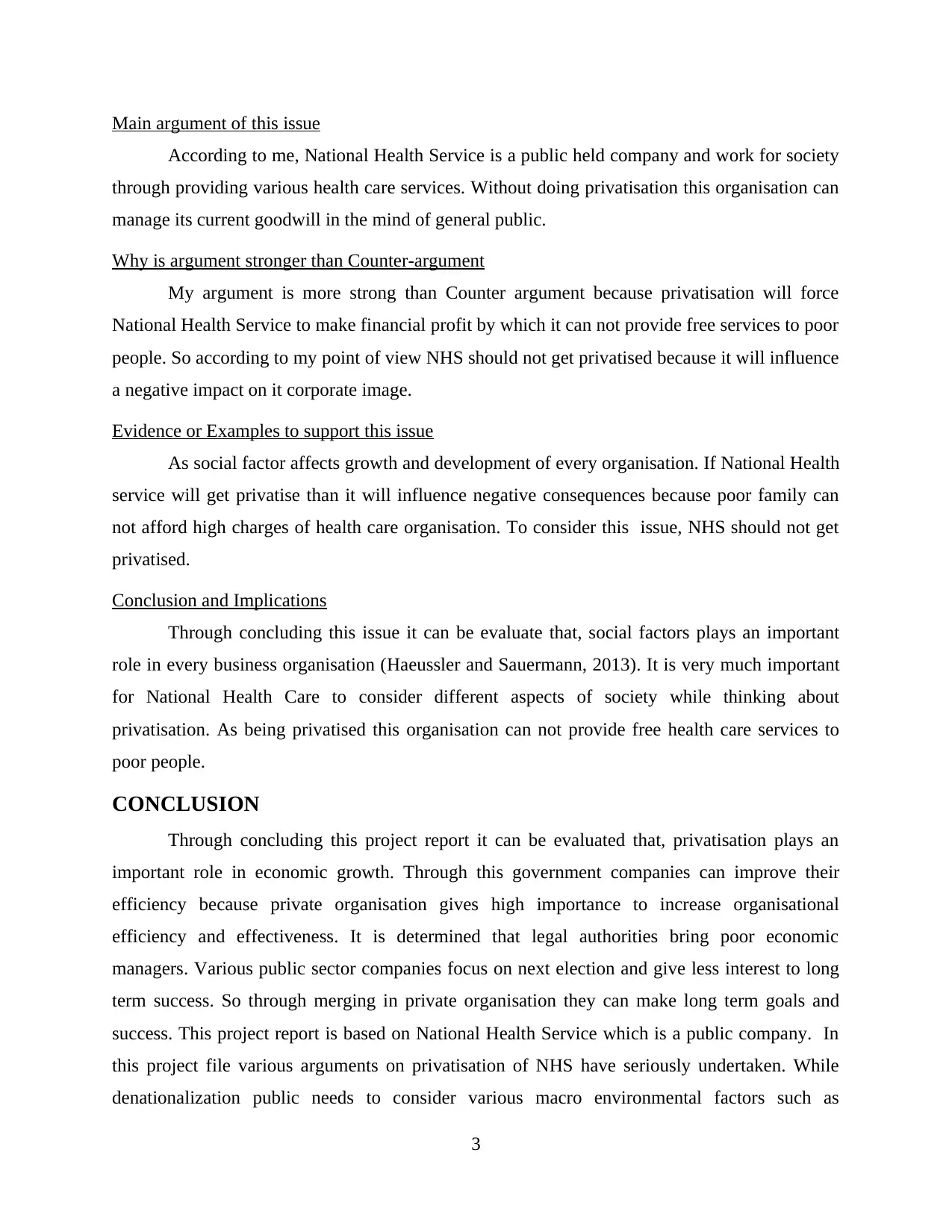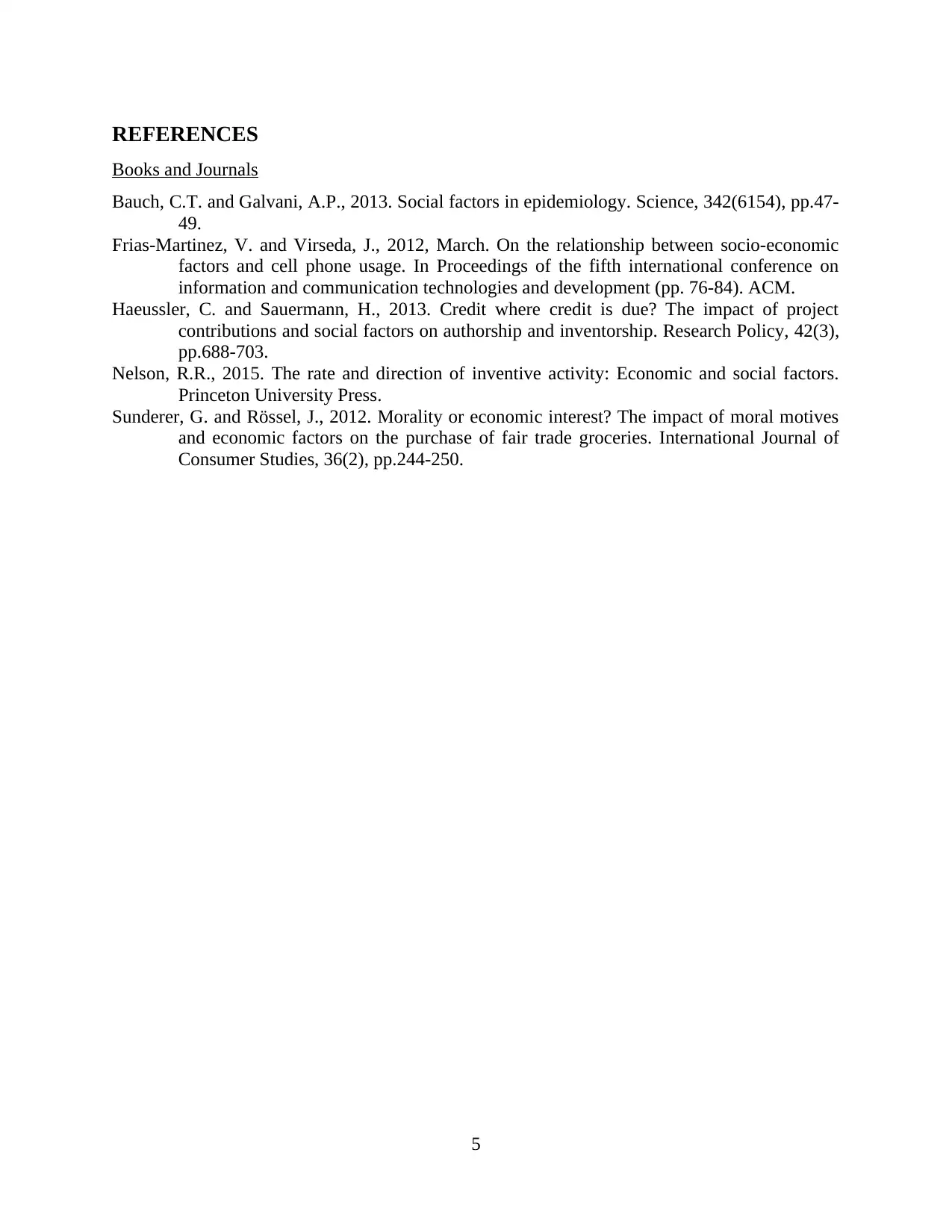Analysis of the Privatization of the NHS: Economic and Social Factors
VerifiedAdded on 2020/06/06
|7
|1390
|168
Report
AI Summary
This report delves into the contentious issue of privatizing the National Health Service (NHS). It begins with an introduction defining privatization and its implications, followed by a detailed analysis of the economic and social factors involved. The economic section examines arguments for and against privatization, considering factors such as competition, profit maximization, labor costs, and legal policies. The social section explores the impact on public goodwill, social welfare, and the ability to provide free healthcare services. The report provides a critical evaluation of the counter-arguments, emphasizing the importance of social factors and the potential negative consequences of privatization. The conclusion synthesizes the findings, arguing that while privatization may improve efficiency, the NHS should prioritize social welfare. The report references several academic sources to support its arguments.

Academic English
Paraphrase This Document
Need a fresh take? Get an instant paraphrase of this document with our AI Paraphraser

Table of Contents
INTRODUCTION...........................................................................................................................1
Body paragraph 1- Economic..........................................................................................................1
Why this is a key issue................................................................................................................1
Counter-argument of this issue...................................................................................................1
Main argument of this issue........................................................................................................2
Why is argument stronger than the counter argument................................................................2
Evidence and examples to support issue.....................................................................................2
Conclusion and Implications.......................................................................................................2
Body paragraph 2- Social.................................................................................................................2
Why this is key issue...................................................................................................................2
What is the Counter-argument of this issue................................................................................2
Main argument of this issue........................................................................................................3
Why is argument stronger than Counter-argument.....................................................................3
Evidence or Examples to support this issue................................................................................3
Conclusion and Implications.......................................................................................................3
CONCLUSION................................................................................................................................3
REFERENCES................................................................................................................................5
INTRODUCTION...........................................................................................................................1
Body paragraph 1- Economic..........................................................................................................1
Why this is a key issue................................................................................................................1
Counter-argument of this issue...................................................................................................1
Main argument of this issue........................................................................................................2
Why is argument stronger than the counter argument................................................................2
Evidence and examples to support issue.....................................................................................2
Conclusion and Implications.......................................................................................................2
Body paragraph 2- Social.................................................................................................................2
Why this is key issue...................................................................................................................2
What is the Counter-argument of this issue................................................................................2
Main argument of this issue........................................................................................................3
Why is argument stronger than Counter-argument.....................................................................3
Evidence or Examples to support this issue................................................................................3
Conclusion and Implications.......................................................................................................3
CONCLUSION................................................................................................................................3
REFERENCES................................................................................................................................5

INTRODUCTION
Privatisation meaning can be define in various ways. Firstly, it is an procedure of
transferring ownership of agency, business, enterprise, public or private property from
government sector to private sector. It includes transfer of profitable and non profitable
organisation. In simple words, in this public sector make outsourcing of private enterprise. In
this, shares of public traded company is purchased by privately held organisation. Through this
various business can convert in joint stock firm. This project report is based on an issue which is
that The NHS should be privatised. Basically, it is an organisation which provides health related
services at national level. In this project report, various issues are argued in against and favour of
privatisation of National Health Service (Frias-Martinez and Virseda, 2012). In United Kingdom
it is becoming much more important questions that NHS should be privatised or not? To better
understand this issue various aspects have been determined in this report. Through evaluating
economical and social macro environmental factors it can be determine that privatisation is
favourable choice or not.
Body paragraph 1- Economic
Why this is a key issue
Every business enterprise is affected by its micro and macro environment factors.
Economic factor is one of the biggest component of business environment. From organisational
point of view economic components are interest rates, labour costs, legal policies, management
and taxes. It is an most powerful issue which can affect privatisation of NHS.
Counter-argument of this issue
Through privatising general people can get lots of benefits. It will results in high
competition and great improvement. But according to me Privatisation of NHS will not going to
be provide such benefits because involving in private company will force NHS to enhance
financial profit instead of providing better health care services (Sunderer and Rössel, 2012).
Main argument of this issue
According to my pint of view, if National Health Service wants to get privatised than it
have to become more responsible towards social welfare. Because without providing better
1
Privatisation meaning can be define in various ways. Firstly, it is an procedure of
transferring ownership of agency, business, enterprise, public or private property from
government sector to private sector. It includes transfer of profitable and non profitable
organisation. In simple words, in this public sector make outsourcing of private enterprise. In
this, shares of public traded company is purchased by privately held organisation. Through this
various business can convert in joint stock firm. This project report is based on an issue which is
that The NHS should be privatised. Basically, it is an organisation which provides health related
services at national level. In this project report, various issues are argued in against and favour of
privatisation of National Health Service (Frias-Martinez and Virseda, 2012). In United Kingdom
it is becoming much more important questions that NHS should be privatised or not? To better
understand this issue various aspects have been determined in this report. Through evaluating
economical and social macro environmental factors it can be determine that privatisation is
favourable choice or not.
Body paragraph 1- Economic
Why this is a key issue
Every business enterprise is affected by its micro and macro environment factors.
Economic factor is one of the biggest component of business environment. From organisational
point of view economic components are interest rates, labour costs, legal policies, management
and taxes. It is an most powerful issue which can affect privatisation of NHS.
Counter-argument of this issue
Through privatising general people can get lots of benefits. It will results in high
competition and great improvement. But according to me Privatisation of NHS will not going to
be provide such benefits because involving in private company will force NHS to enhance
financial profit instead of providing better health care services (Sunderer and Rössel, 2012).
Main argument of this issue
According to my pint of view, if National Health Service wants to get privatised than it
have to become more responsible towards social welfare. Because without providing better
1
⊘ This is a preview!⊘
Do you want full access?
Subscribe today to unlock all pages.

Trusted by 1+ million students worldwide

health care services NHS can not survive in market place and also can not achieve trust of
general people.
Why is argument stronger than the counter argument
My argument is much more stronger as compare to Counter argument. Because privately
held company give their focal point to only profit maximisation. If National Health Service
wants to maintain its goodwill than it should go for privatisation. As it will ruin its current
corporate image in market place (Nelson, 2015).
Evidence and examples to support issue
Through evaluating above mentioned issue it can be said that, privatisation of NHS is not
an good action of government. It is a non profitable firm but by privatisation it also have to pay
extra labour costs and also have to face legal policies of government which can creates various
barriers for it.
Conclusion and Implications
Through concluding this issue, it can be determined that privatisation of National Health
Service can decrease its goodwill. As it provides various free services to poor people but if it will
privatise itself than it have to consider organisational profit, which can influence a negative
impact on its image.
Body paragraph 2- Social
Why this is key issue
Social factor is one of the most important element of macro environment. It is
responsibility of every company to make its strategies and policies to consider social forces as it
can affect lifestyle. It is very much important for NHS to consider social aspects while doing
privatisation because it is a social company.
What is the Counter-argument of this issue
As National Health Service is a public sector company and provides various health care
facilities to poor people but if it will get privatise then it can not maintain it strong goodwill. As
most of private company do not think about social welfare and make their efforts to maximise
their financial profit (Bauch and Galvani, 2013).
2
general people.
Why is argument stronger than the counter argument
My argument is much more stronger as compare to Counter argument. Because privately
held company give their focal point to only profit maximisation. If National Health Service
wants to maintain its goodwill than it should go for privatisation. As it will ruin its current
corporate image in market place (Nelson, 2015).
Evidence and examples to support issue
Through evaluating above mentioned issue it can be said that, privatisation of NHS is not
an good action of government. It is a non profitable firm but by privatisation it also have to pay
extra labour costs and also have to face legal policies of government which can creates various
barriers for it.
Conclusion and Implications
Through concluding this issue, it can be determined that privatisation of National Health
Service can decrease its goodwill. As it provides various free services to poor people but if it will
privatise itself than it have to consider organisational profit, which can influence a negative
impact on its image.
Body paragraph 2- Social
Why this is key issue
Social factor is one of the most important element of macro environment. It is
responsibility of every company to make its strategies and policies to consider social forces as it
can affect lifestyle. It is very much important for NHS to consider social aspects while doing
privatisation because it is a social company.
What is the Counter-argument of this issue
As National Health Service is a public sector company and provides various health care
facilities to poor people but if it will get privatise then it can not maintain it strong goodwill. As
most of private company do not think about social welfare and make their efforts to maximise
their financial profit (Bauch and Galvani, 2013).
2
Paraphrase This Document
Need a fresh take? Get an instant paraphrase of this document with our AI Paraphraser

Main argument of this issue
According to me, National Health Service is a public held company and work for society
through providing various health care services. Without doing privatisation this organisation can
manage its current goodwill in the mind of general public.
Why is argument stronger than Counter-argument
My argument is more strong than Counter argument because privatisation will force
National Health Service to make financial profit by which it can not provide free services to poor
people. So according to my point of view NHS should not get privatised because it will influence
a negative impact on it corporate image.
Evidence or Examples to support this issue
As social factor affects growth and development of every organisation. If National Health
service will get privatise than it will influence negative consequences because poor family can
not afford high charges of health care organisation. To consider this issue, NHS should not get
privatised.
Conclusion and Implications
Through concluding this issue it can be evaluate that, social factors plays an important
role in every business organisation (Haeussler and Sauermann, 2013). It is very much important
for National Health Care to consider different aspects of society while thinking about
privatisation. As being privatised this organisation can not provide free health care services to
poor people.
CONCLUSION
Through concluding this project report it can be evaluated that, privatisation plays an
important role in economic growth. Through this government companies can improve their
efficiency because private organisation gives high importance to increase organisational
efficiency and effectiveness. It is determined that legal authorities bring poor economic
managers. Various public sector companies focus on next election and give less interest to long
term success. So through merging in private organisation they can make long term goals and
success. This project report is based on National Health Service which is a public company. In
this project file various arguments on privatisation of NHS have seriously undertaken. While
denationalization public needs to consider various macro environmental factors such as
3
According to me, National Health Service is a public held company and work for society
through providing various health care services. Without doing privatisation this organisation can
manage its current goodwill in the mind of general public.
Why is argument stronger than Counter-argument
My argument is more strong than Counter argument because privatisation will force
National Health Service to make financial profit by which it can not provide free services to poor
people. So according to my point of view NHS should not get privatised because it will influence
a negative impact on it corporate image.
Evidence or Examples to support this issue
As social factor affects growth and development of every organisation. If National Health
service will get privatise than it will influence negative consequences because poor family can
not afford high charges of health care organisation. To consider this issue, NHS should not get
privatised.
Conclusion and Implications
Through concluding this issue it can be evaluate that, social factors plays an important
role in every business organisation (Haeussler and Sauermann, 2013). It is very much important
for National Health Care to consider different aspects of society while thinking about
privatisation. As being privatised this organisation can not provide free health care services to
poor people.
CONCLUSION
Through concluding this project report it can be evaluated that, privatisation plays an
important role in economic growth. Through this government companies can improve their
efficiency because private organisation gives high importance to increase organisational
efficiency and effectiveness. It is determined that legal authorities bring poor economic
managers. Various public sector companies focus on next election and give less interest to long
term success. So through merging in private organisation they can make long term goals and
success. This project report is based on National Health Service which is a public company. In
this project file various arguments on privatisation of NHS have seriously undertaken. While
denationalization public needs to consider various macro environmental factors such as
3

economical and social so that it can accomplish its desired goals and objectives. In this file,
various favourable and unfavourable aspects of privatisation have been evaluated so that it can
be determined that NHS should be privatised or not.
4
various favourable and unfavourable aspects of privatisation have been evaluated so that it can
be determined that NHS should be privatised or not.
4
⊘ This is a preview!⊘
Do you want full access?
Subscribe today to unlock all pages.

Trusted by 1+ million students worldwide

REFERENCES
Books and Journals
Bauch, C.T. and Galvani, A.P., 2013. Social factors in epidemiology. Science, 342(6154), pp.47-
49.
Frias-Martinez, V. and Virseda, J., 2012, March. On the relationship between socio-economic
factors and cell phone usage. In Proceedings of the fifth international conference on
information and communication technologies and development (pp. 76-84). ACM.
Haeussler, C. and Sauermann, H., 2013. Credit where credit is due? The impact of project
contributions and social factors on authorship and inventorship. Research Policy, 42(3),
pp.688-703.
Nelson, R.R., 2015. The rate and direction of inventive activity: Economic and social factors.
Princeton University Press.
Sunderer, G. and Rössel, J., 2012. Morality or economic interest? The impact of moral motives
and economic factors on the purchase of fair trade groceries. International Journal of
Consumer Studies, 36(2), pp.244-250.
5
Books and Journals
Bauch, C.T. and Galvani, A.P., 2013. Social factors in epidemiology. Science, 342(6154), pp.47-
49.
Frias-Martinez, V. and Virseda, J., 2012, March. On the relationship between socio-economic
factors and cell phone usage. In Proceedings of the fifth international conference on
information and communication technologies and development (pp. 76-84). ACM.
Haeussler, C. and Sauermann, H., 2013. Credit where credit is due? The impact of project
contributions and social factors on authorship and inventorship. Research Policy, 42(3),
pp.688-703.
Nelson, R.R., 2015. The rate and direction of inventive activity: Economic and social factors.
Princeton University Press.
Sunderer, G. and Rössel, J., 2012. Morality or economic interest? The impact of moral motives
and economic factors on the purchase of fair trade groceries. International Journal of
Consumer Studies, 36(2), pp.244-250.
5
1 out of 7
Related Documents
Your All-in-One AI-Powered Toolkit for Academic Success.
+13062052269
info@desklib.com
Available 24*7 on WhatsApp / Email
![[object Object]](/_next/static/media/star-bottom.7253800d.svg)
Unlock your academic potential
Copyright © 2020–2026 A2Z Services. All Rights Reserved. Developed and managed by ZUCOL.





